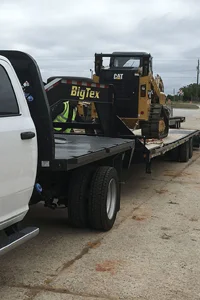Technology in Trucking
Technology in Trucking: The Road to the Future
Ah, the trucking industry! It's not just about burly drivers and big rigs anymore. We're talking about a full-blown technological revolution that's transforming how goods are transported and managed. From telematics and autonomous vehicles to advanced logistics software, technology is making trucking more efficient, safer, and greener. Buckle up as we explore the key technological advancements in the trucking industry and their impact on operations and the future of transportation.
Telematics and Fleet Management Systems
Remember the days when truckers relied on CB radios and paper maps? Well, those days are long gone, thanks to telematics systems. These bad boys provide real-time data on vehicle location, performance, and driver behavior. Here are some of the perks:
- Real-Time Tracking: GPS tracking lets fleet managers keep an eye on every truck, improving route planning and delivery times. No more "Where's Waldo?" moments!
- Driver Behavior Monitoring: Telematics can track driving habits like speeding, harsh braking, and idling. It's like having a backseat driver, but one that actually helps promote safer driving practices.
- Maintenance Alerts: Predictive maintenance alerts notify managers of potential issues before they become critical. It's like having a crystal ball for your truck's health.
- Fuel Efficiency: By analyzing driving patterns and routes, telematics can identify ways to reduce fuel consumption and emissions. Your wallet and the planet will thank you.
Autonomous Trucks
Autonomous trucks are the stuff of sci-fi dreams, but they're becoming a reality. These self-driving vehicles could revolutionize transportation with benefits like:
- Increased Safety: Autonomous trucks can reduce accidents caused by human error, like fatigue and distracted driving. Imagine a world where trucks don't need coffee breaks!
- Operational Efficiency: Self-driving trucks can operate continuously without rest breaks, speeding up deliveries. It's like having a trucker who never needs to sleep.
- Cost Savings: Automation can slash labor costs and optimize fuel consumption. More money in the bank and less spent on diesel.
- Environmental Impact: Autonomous vehicles can be programmed to drive in the most fuel-efficient manner, cutting down on greenhouse gas emissions. Mother Earth approves.
While fully autonomous trucks are still in the testing phase, driver-assistance technologies like adaptive cruise control and lane-keeping assistance are already making roads safer and more efficient.
Advanced Logistics Software
Logistics software is the unsung hero of the supply chain, optimizing everything from routes to inventory. Key features include:
- Route Optimization: Sophisticated algorithms determine the most efficient routes, reducing travel time and fuel consumption. It's like having a GPS on steroids.
- Load Planning: Advanced tools ensure trucks are loaded to maximize space and weight capacity, cutting down on trips. Think of it as Tetris, but with cargo.
- Inventory Management: Real-time tracking helps companies manage stock levels more effectively, reducing waste and ensuring timely deliveries. No more "out of stock" nightmares.
- Customer Communication: Automated notifications and tracking updates keep customers in the loop about their shipments, boosting satisfaction. Happy customers, happy life.
Electric Trucks
Electric trucks are charging ahead as companies aim to reduce their carbon footprint. Benefits include:
- Zero Emissions: Electric trucks produce no tailpipe emissions, leading to cleaner air and fewer greenhouse gases. Breathe easy, folks.
- Lower Operating Costs: Electricity is cheaper than diesel, and electric trucks have fewer moving parts, meaning lower maintenance costs. More savings, less hassle.
- Noise Reduction: Electric trucks are quieter than their diesel counterparts, reducing noise pollution in urban areas. Your ears will thank you.
- Incentives and Regulations: Governments offer incentives for adopting electric vehicles, and regulations are increasingly favoring low-emission options. It's a win-win.
While challenges like range limitations and charging infrastructure remain, advancements in battery technology are making electric trucks a viable option for many fleets.
Blockchain Technology
Blockchain isn't just for Bitcoin anymore. It's becoming a powerful tool for improving transparency and security in the supply chain. Applications include:
- Enhanced Transparency: Blockchain provides a decentralized and immutable ledger of transactions, offering greater visibility into the supply chain. No more shady dealings.
- Fraud Prevention: The secure nature of blockchain helps prevent fraud and tampering with shipment data. It's like having a digital bodyguard.
- Streamlined Payments: Smart contracts can automate payment processes, reducing delays and errors. Faster payments, fewer headaches.
- Efficient Documentation: Blockchain can streamline the management of shipping documents, reducing administrative burdens and improving efficiency. Less paperwork, more productivity.
Conclusion
Technology is driving significant changes in the trucking industry, making it more efficient, safe, and sustainable. From telematics and autonomous trucks to electric vehicles and blockchain, these advancements are shaping the future of transportation. Embracing these technologies will be essential for companies looking to stay competitive and meet the evolving demands of the market. As the industry continues to innovate, the benefits of these technologies will become increasingly evident, paving the way for a more efficient and environmentally friendly trucking sector.





